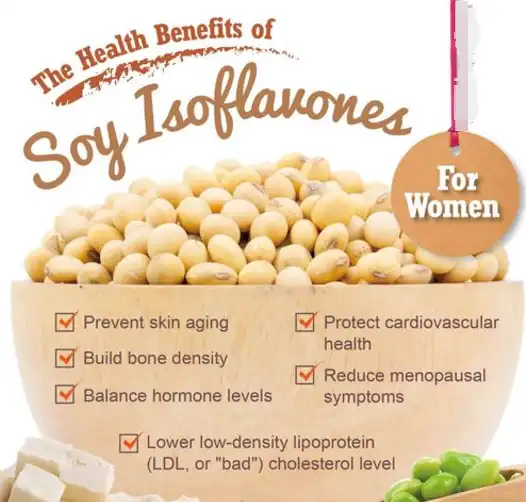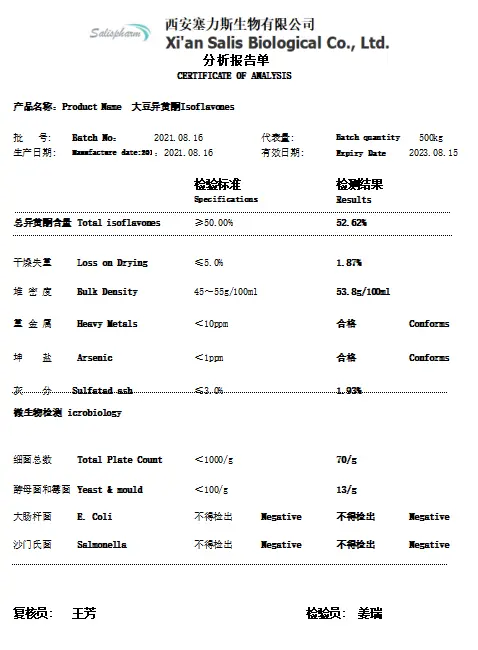Soy isoflavones powder has gained significant attention in recent years for its potential to support hormonal balance. This natural supplement, derived from soybeans, contains compounds that mimic estrogen in the body. As a result, many people, especially women experiencing hormonal fluctuations, have turned to soy isoflavones as a possible solution. In this blog post, we'll explore the relationship between soy isoflavones powder and hormonal balance, addressing some of the most common questions and concerns.

How do soy isoflavones affect estrogen levels in the body?
Soy Isoflavones Powder are phytoestrogens, plant-based compounds that can interact with estrogen receptors in the body. These compounds, primarily genistein and daidzein, have a chemical structure similar to estrogen, allowing them to bind to estrogen receptors and potentially influence hormonal activity. When consumed, soy isoflavones can have both estrogenic and anti-estrogenic effects, depending on various factors such as the individual's hormonal status and the specific tissues involved.
The impact of soy isoflavones on estrogen levels can vary among individuals. In some cases, they may help to balance estrogen levels by:
- Providing a mild estrogenic effect when natural estrogen levels are low, such as during menopause
- Competing with stronger forms of estrogen for receptor binding, potentially reducing overall estrogenic activity when estrogen levels are high
- Influencing the metabolism and excretion of estrogen in the body
Research has shown that soy isoflavones may be particularly beneficial for postmenopausal women. A study published in the Journal of Clinical Endocrinology & Metabolism found that soy isoflavone supplementation could increase estradiol concentrations in postmenopausal women, potentially alleviating some symptoms associated with low estrogen levels.
However, it's important to note that the effects of soy isoflavones on estrogen levels can be complex and may vary based on factors such as an individual's age, hormonal status, and overall health. Some studies have found minimal effects on circulating estrogen levels, while others have observed more significant changes. The dosage and form of soy isoflavones consumed can also influence their impact on hormonal balance.
Can soy isoflavones help with menopausal symptoms?
Menopausal symptoms, such as hot flashes, night sweats, and mood swings, are often associated with declining estrogen levels. Many women turn to soy isoflavones as a natural alternative to hormone replacement therapy, hoping to alleviate these uncomfortable symptoms. The potential benefits of soy isoflavones for menopausal women have been the subject of numerous studies, with mixed but generally promising results.
Several clinical trials have demonstrated that soy isoflavones may help reduce the frequency and severity of hot flashes in menopausal women. A meta-analysis published in the journal Menopause reviewed 17 studies and found that soy isoflavone supplements were significantly more effective than placebo in reducing hot flash frequency and severity. The analysis suggested that higher doses of isoflavones (at least 54 mg per day) and longer duration of use (at least 12 weeks) were associated with greater benefits.
In addition to hot flashes, Soy Isoflavones Powder may offer other benefits for menopausal women:
- Bone health: Some studies suggest that soy isoflavones may help maintain bone density in postmenopausal women, potentially reducing the risk of osteoporosis.
- Cardiovascular health: Soy isoflavones may have a positive impact on cholesterol levels and cardiovascular risk factors in postmenopausal women.
- Cognitive function: Preliminary research indicates that soy isoflavones might help maintain cognitive function in postmenopausal women, although more studies are needed to confirm this effect.
While many women report improvements in menopausal symptoms with soy isoflavone supplementation, it's important to note that individual responses can vary. Factors such as genetics, gut microbiome composition, and overall diet may influence how effectively an individual metabolizes and benefits from soy isoflavones. Additionally, the effects may not be immediate, and consistent use over several weeks or months may be necessary to observe significant improvements.
Are there any potential risks or side effects of taking soy isoflavones?
While Soy Isoflavones Powder are generally considered safe for most people when consumed in moderate amounts, it's essential to be aware of potential risks and side effects. As with any supplement, individual responses can vary, and some people may be more sensitive to the effects of soy isoflavones than others.
Common side effects reported by some individuals taking soy isoflavone supplements include:
- Digestive discomfort: Some people may experience bloating, gas, or stomach upset when consuming soy products or supplements.
- Headaches: In rare cases, soy isoflavones may trigger headaches in sensitive individuals.
- Menstrual changes: Some women have reported changes in their menstrual cycle when taking soy isoflavones, although these effects are typically mild and temporary.
It's important to note that most of these side effects are mild and often resolve as the body adjusts to the supplement. However, there are some situations where caution is advised:
- Thyroid conditions: Soy isoflavones may interfere with thyroid hormone production or absorption of thyroid medication. Individuals with thyroid disorders should consult their healthcare provider before using soy isoflavone supplements.
- Hormone-sensitive conditions: Women with a history of hormone-sensitive cancers, such as breast cancer, should speak with their doctor before using soy isoflavone supplements, as the estrogenic effects of these compounds may be a concern in some cases.
- Interactions with medications: Soy isoflavones may interact with certain medications, including blood thinners and some types of antidepressants. It's essential to inform your healthcare provider about all supplements you're taking.
Despite these potential concerns, numerous studies have found soy isoflavones to be safe for most people when consumed in recommended amounts. A comprehensive review published in the journal Nutrients concluded that soy isoflavone supplements do not adversely affect thyroid function in healthy individuals and do not increase the risk of breast cancer.
As with any dietary supplement, it's crucial to purchase soy isoflavone powder from reputable sources and follow the recommended dosage instructions. Consulting with a healthcare professional before starting any new supplement regimen is always advisable, especially for individuals with pre-existing health conditions or those taking medications.
Conclusion
Soy isoflavones powder shows promise in supporting hormonal balance, particularly for women experiencing menopausal symptoms. While research results are mixed, many studies suggest that soy isoflavones can help alleviate hot flashes, support bone health, and potentially offer other benefits related to hormonal balance. However, as with any supplement, individual responses may vary, and it's essential to approach soy isoflavone supplementation with an informed perspective.
If you're considering using soy isoflavones powder to support your hormonal health, it's recommended to consult with a healthcare professional who can provide personalized advice based on your individual health status and needs. By combining supplement use with a balanced diet, regular exercise, and other healthy lifestyle habits, you can take a comprehensive approach to maintaining hormonal balance and overall well-being.
If you are also interested in this product and want to know more product details, or want to know about other related products, please feel free to contact lea_slsbio@163.com,WhatsApp+86 13193326505.

References
1. Messina M. Soy and Health Update: Evaluation of the Clinical and Epidemiologic Literature. Nutrients. 2016;8(12):754.
2. Taku K, et al. Extracted or synthesized soybean isoflavones reduce menopausal hot flash frequency and severity: systematic review and meta-analysis of randomized controlled trials. Menopause. 2012;19(7):776-790.
3. Chen MN, et al. Efficacy of phytoestrogens for menopausal symptoms: a meta-analysis and systematic review. Climacteric. 2015;18(2):260-269.
4. Sathyapalan T, et al. The effect of soy phytoestrogen supplementation on thyroid status and cardiovascular risk markers in patients with subclinical hypothyroidism: a randomized, double-blind, crossover study. J Clin Endocrinol Metab. 2011;96(5):1442-1449.
5. Morabito N, et al. Effects of genistein and hormone-replacement therapy on bone loss in early postmenopausal women: a randomized double-blind placebo-controlled study. J Bone Miner Res. 2002;17(10):1904-1912.
6. Kreijkamp-Kaspers S, et al. Effect of soy protein containing isoflavones on cognitive function, bone mineral density, and plasma lipids in postmenopausal women: a randomized controlled trial. JAMA. 2004;292(1):65-74.

